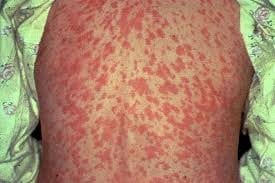WASHINGTON’S state governor declared a state of emergency related to the measles outbreak unfolding in Clark County on January 25:
https://www.doh.wa.gov/YouandYourFamily/IllnessandDisease/Measles/MeaslesOutbreak.
At this time, a single case related to the outbreak has been reported in Oregon state:
https://www.oregon.gov/oha/PH/DiseasesConditions/DiseasesAZ/Pages/measles.aspx
To date, no cases have been reported in BC related to the Washington state outbreak. However, travellers to the affected communities are at potential risk of exposure to measles, because people with measles can infect others prior to the onset of symptoms like fever and rash. While it is expected that most travellers will be immune to measles, some individuals will be susceptible, including infants less than one year old or people who have never been immunized against measles.
Measles is highly infectious and spreads through the air by coughing and sneezing, as well as respiratory secretions. The best protection against measles is vaccination.
BCCDC advises British Columbians to review and update their immunization status at any time, and especially prior to any travel. The measles vaccine is available as a combined measles, mumps and rubella (MMR) vaccine, and is available from your local health unit, family doctor, and many pharmacists. MMR vaccine is safe and effective; however, it is a live virus vaccine and cannot be given to some people with certain types of weakened immunity. To find a public health unit anywhere in the province, see the site finder on ImmunizeBC.ca.
In BC, children receive two doses of measles-containing vaccine during routine immunization, with the first at 12 months of age and the second at four years of age or school entry. All school-age children, university students and those traveling out of the country and born on or after January 1, 1970 should have received two doses of measles-containing vaccine, as should health-care workers born on or after January 1, 1957.
BC typically experiences a few cases of measles each year, usually among under-vaccinated travellers returning from parts of the world where measles is still common. In 2018, six cases of measles were reported among BC residents: two cases acquired infection during travel out of Canada (India and Philippines, respectively), and four acquired infection from imported cases. To date, a single case of measles was reported in BC in 2019 in an adult traveller returning from the Philippines.
Measles is rare in North America, and a single case results in a cascade of public health activity to ensure that transmission from the case is minimized. Each case is reported to and carefully assessed by public health authorities for potential transmission to others. Exposed non-immune individuals are offered preventive measures including vaccine. In the past year, measles outbreaks have occurred in several countries in Western Europe. Present outbreaks in the US include the outbreak in Washington state as well as an outbreak among the Orthodox Jewish community in New York.
In BC, measles vaccine uptake is assessed in children at the 2nd and 7th birthdays. For the most recent years of data available, 87.3 per cent of children turning two had received one dose of measles vaccine, and 88.4 per cent of children turning seven had received two doses, based on data in the provincial immunization registry reported by BC health authorities. In order to ensure interruption of transmission of measles in populations, a level of population immunity of 95 per cent is recommended. There are pockets of unvaccinated people in several parts of BC. The last large outbreaks of measles in BC were in 2014 and 2010.
Those who are concerned about their potential measles exposure but have no symptoms can call 8-1-1 and speak to a nurse.
For more information about measles, see:
- Information about measles on the BCCDC website
- Data and reports on Vaccine Preventable Diseases tab.
The BC Centre for Disease Control, a part of the Provincial Health Services Authority, provides public health leadership through surveillance, detection, treatment, prevention and consultation services. The Centre provides diagnostic and treatment services for people with diseases of public health importance, and analytical and policy support to all levels of government and health authorities. The BCCDC also provides health promotion and prevention services to reduce the burden of chronic disease and preventable injury. For more, visit www.bccdc.ca or follow on Twitter @CDCofBC.










